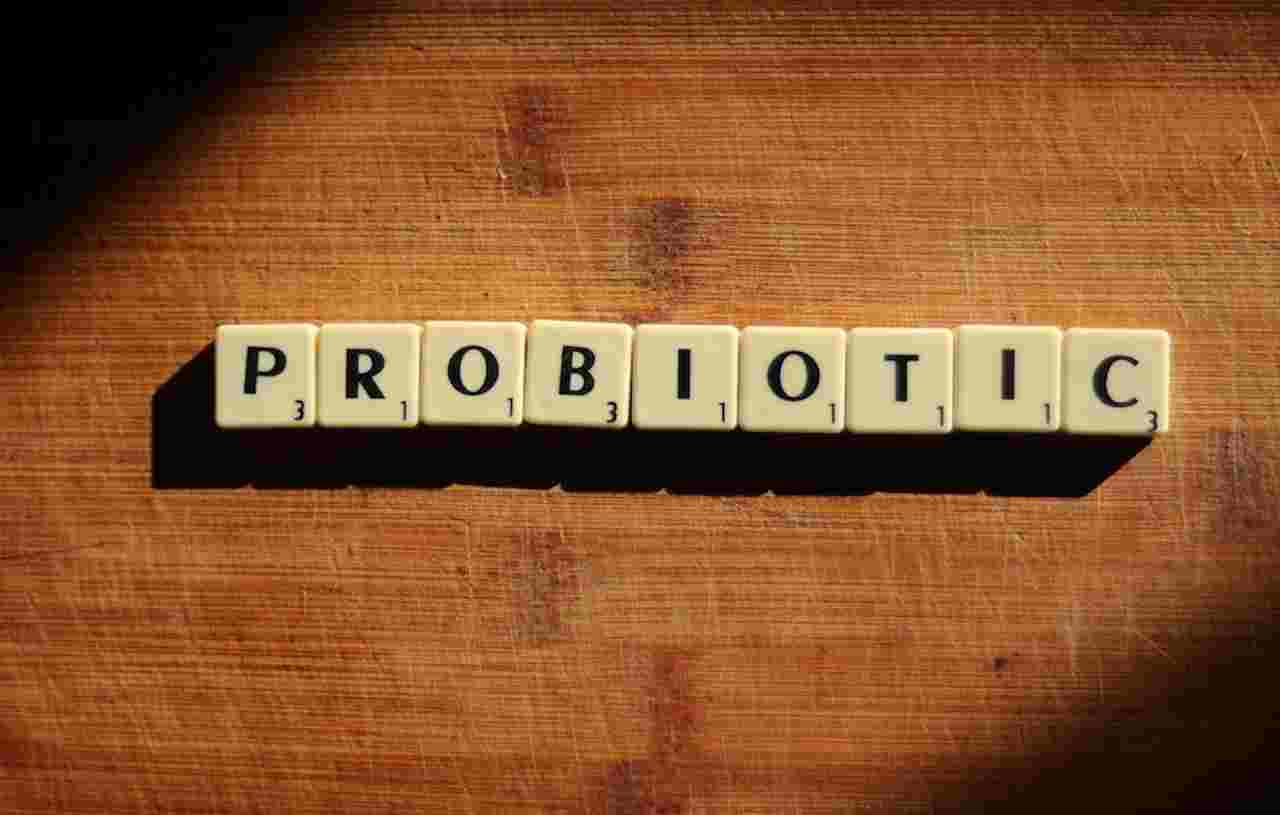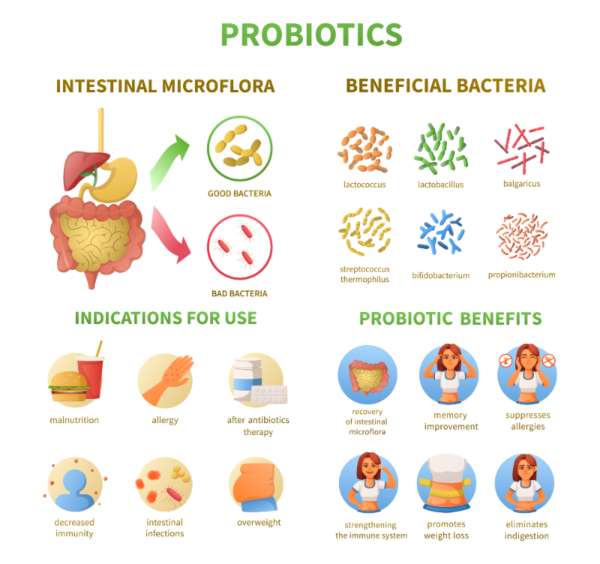Get In Touch
Info@fitfaysal.com

Probiotics are living, good microorganisms that benefit your health, especially your digestive system.
They are often referred to as “good bacteria” or helpful bacteria because they help to maintain a healthy balance in our bodies and eliminate extra bad bacteria.
“Probiotic” is a Greek word that literally means “promoting life,” so it’s safe to say they can be quite beneficial for you.
You may be thinking: “Why would I intentionally consume bacteria?”
However, you’d be wrong to assume that all types of bacteria are bad.
Let’s look at a simple explanation to resolve any confusion you may have with probiotics.
Probiotics, when digested, travel through our digestive system and reach our gut, where they interact with the existing community of bacteria.
They help maintain a healthy balance between good and bad bacteria in the gut environment, which promotes digestion and reduces the negative effects that a dominance of bad bacteria can cause.
That being said, let’s get into the list.

70–75% of your immune system is in your gut.
So, doing the simple things you can do to improve your gut health may improve the general quality of your overall health.
Although the following probiotic foods aren’t “miraculous,” consciously adding them to your meals may keep your stomach happy.
Yogurt, as we all know and love, is a fermented dairy product made from milk cultured with beneficial bacteria.
The probiotics found in yogurt help populate the gut with beneficial microbes, promoting digestion and boosting immunity.
Yogurt is rich in protein, calcium, and vitamins B12 and D, which support overall health, with benefits including:
Related: 8 Health Benefits of Yogurt Parfaits That May Surprise You
Pap, or Akamu or Ogi, is our traditional Nigerian porridge made from fermented maize or millet.
The fermentation process gives pap its probiotic properties, as beneficial bacteria like Lactobacillus species thrive during fermentation.
Pap is rich in carbohydrates, vitamins, and minerals like iron and magnesium.
Unripe plantains are one of our staple foods, often eaten boiled or roasted.
They contain resistant starch, a type of fiber that acts as a prebiotic, promoting the growth of beneficial bacteria in the gut.
Additionally, unripe plantains are rich in vitamins B6 and C, potassium, and dietary fiber. Eating unripe plantains regularly may provide benefits like:
Kefir is a fermented milk drink similar to yogurt but with a thinner consistency.
It contains a diverse range of probiotic bacteria and yeasts, which help balance the gut microbiome, promote digestion, and reduce inflammation.
Kefir’s probiotic properties stem from the fermentation of milk with kefir grains.
Dawadawa, also known as African locust bean, is a Nigerian time-tested traditional fermented flavoring made from the seeds of the African locust bean tree.
The fermentation process gives dawadawa its probiotic properties, as beneficial bacteria like Bacillus species thrive during fermentation.
Additionally, dawadawa is rich in nutrients such as protein, vitamins, and minerals like calcium and iron.
Fufu is one of our staple traditional foods, made from starchy vegetables like cassava or yam.
The fermentation process involved in making fufu gives it probiotic properties, as beneficial bacteria are introduced to it during fermentation.
Fufu is rich in carbohydrates and dietary fiber, providing sustained energy and promoting digestive health.
Related: 20 High Fiber Nigerian Foods You Need to Start Eating Now
Kunu, which is made from grains like millet or sorghum, is consumed as a refreshing drink and, not so surprisingly, contains probiotics.
The fermentation process involved in making kunu contributes to its probiotic properties, as good bacteria like Lactobacillus species thrive during fermentation.
Kunu is rich in iron, carbohydrates, vitamins, and minerals like magnesium.
Cottage cheese is a fresh cheese made from curdled milk with a creamy texture and mild flavor.
While not traditionally Nigerian, this fermented food can still be commonly found in Nigeria and is a great source of probiotics.
Cottage cheese contains beneficial bacteria such as Lactobacillus acidophilus and Bifidobacterium lactis, which contribute to gut health.
It is also rich in protein, calcium, and vitamins B12 and D
Garri is made from cassava tubers and is typically drunk and eaten as a great carbohydrate source.
During the fermentation process of making garri, beneficial bacteria are introduced to it, contributing to its probiotic properties.
Garri is also rich in carbohydrates, fiber, and small amounts of vitamins and minerals.
Palm wine is a traditional Nigerian alcoholic beverage made from the sap of various palm tree species, particularly the African oil palm.
While primarily known for its alcoholic content, palm wine also contains natural yeasts and good types of bacteria acquired during the fermentation process.
These microbes contribute to its probiotic properties and may support gut health.
Palm wine is also rich in antioxidants, vitamins, and minerals like potassium and magnesium.
Apple cider vinegar (ACV) is a fermented vinegar made from crushed apples and yeast, which convert the sugars into alcohol and then acetic acid. While not a traditional Nigerian item, ACV can be added to diets for its probiotic benefits.
ACV is also rich in antioxidants and prebiotic fibers, with some benefits including:
Adding these foods to your meals may help support a healthy gut microbiome and promote digestive wellness.
Check out: 25 Low Calorie Nigerian Foods That Will Make Your Diet Easy
Before you go, you may as well check out the benefits of probiotics that contribute to a healthier and more functional gut.
Probiotics play a big role in stimulating enzymes that break down food in your digestive system.
These enzymes, such as amylase, protease, and lipase, are essential for breaking down carbohydrates, proteins, and fats, respectively.
Probiotics help improve digestion efficiency by enhancing enzyme activity, which ensures that the body properly absorbs and utilizes nutrients.
This process contributes to overall digestive health and may alleviate symptoms of indigestion, bloating, and discomfort.
One well-known benefit of probiotics is their ability to reduce the frequency and severity of diarrhea.
Probiotics contribute to maintaining a healthy balance of beneficial bacteria in the gut.
This balance stops diarrhea, mostly caused by infections, antibiotics, or digestive issues.
Probiotics play a vital role in regulating the immune system and enhancing the immune response.
The gut contains the majority of your body’s immune cells, making the gut an important site for immune function.
Probiotics interact with immune cells in the gut, stimulating the production of antibodies that aid in the fight against harmful pathogens and infections.
Probiotics have shown promise in the treatment of IBS, a common gastrointestinal disorder with symptoms including abdominal pain, bloating, and altered bowel habits.
Certain probiotics have been shown to help with IBS symptoms by restoring gut microbial balance, reducing inflammation, and improving bowel function.
Related: The Low FODMAP Pasta and Grains for IBS (Complete List)
Probiotics are highly unregulated because they are considered “dietary supplements” and not “medical products.”
So, science hasn’t fully backed most of the health benefits claimed by probiotic supplements you’ve likely seen.
Your microbiome is unique and specific to you; it can even be considered a second set of DNA, so due to the uniqueness of our body’s probiotic makeup, a “one-size-fits-all” probiotic supplement wouldn’t do much or anything for you.